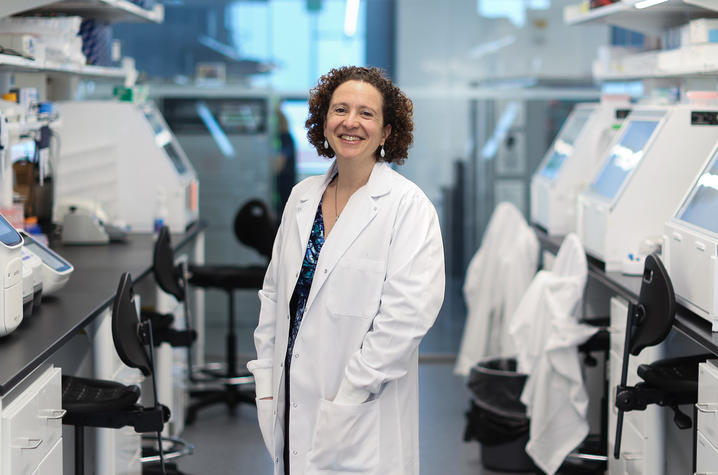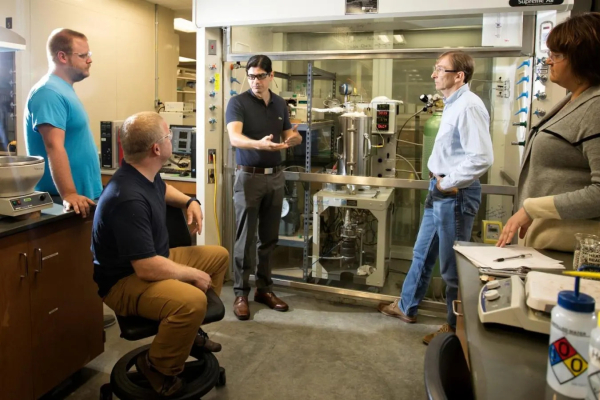How NIH funding supports resources for UK researchers

The National Institutes of Health (NIH) support research at the University of Kentucky in a variety of ways — from individual grants to supports for centers and graduate students.
Acting Vice President for Research Ilhem Messaoudi offers a breakdown of this support as part of a recent video campaign from Research Communications.
The impact of NIH-funded research
There are fundamental discoveries happening in our labs. Those innovations become new therapies and treatments for patients across UK HealthCare. Our research shapes the way we understand challenges facing Kentucky. And our innovations significantly impact Kentuckians and the nation.
Researchers on our campus create new knowledge and pass that on to the next generation of physicians and scientists. As researchers at a public university, we have the privilege of receiving funds from the National Institutes of Health. This support allows us to do the impactful work of changing lives.
What are indirect costs?
The term “indirect costs” is at the crux of the national conversation right now on federal research dollars. Indirect costs are also referred to as Facilities and Administrative costs or “F&A” costs. Federal agencies reimburse universities like UK for the real costs incurred to do research and these dollars help keep research labs going.
These costs include:
- Building operation, maintenance and utility costs
- High-tech lab equipment
- High-speed data processing, storage and security
- Grants management activities like submitting proposals and receiving, managing and reporting on funds awarded by federal agencies
- Federal regulatory compliance like training, reviewing and reporting required to conduct federally funded projects.
UK’s ‘trifecta’ of NIH-funded centers
UK has a unique research enterprise with a “trifecta” of research designations in cancer, aging and translational science — the Markey Cancer Center, the Sanders-Brown Center on Aging and the Center for Clinical and Translational Science.
All are supported by prestigious, competitive grants from the National Institutes of Health.
For more than 40 years, the Markey Cancer Center has served Kentuckians battling cancer.
Markey is Kentucky’s only Comprehensive Cancer Center designated by the National Cancer Institute. This distinction means Markey can offer cancer patients access to new treatments only available here.
Indirect costs provide a direct lifeline to keep labs running and equipment maintained — allowing Markey to advance precision cancer research.
These dollars also support the next generation of cancer researchers enrolled in training programs at Markey.
For 40 years, UK’s Sanders-Brown Center on Aging has housed Kentucky’s Alzheimer’s Disease Research Center — one of the original 10 centers launched by the National Institute on Aging.
Indirect costs support Sanders-Brown researchers’ innovative work on blood tests to help diagnose disease-related changes in the brain early.
Those dollars support in-person community events and telehealth outreach to target high blood pressure, high cholesterol, alcohol use and depression — major risk factors for dementia.
For nearly 20 years, UK’s Center for Clinical and Translational Science (CCTS) has united researchers, clinicians and communities to turn scientific discovery into health improvements.
It’s funded by a Clinical and Translational Science Award from the National Center for Advancing Translational Sciences.
Indirect costs support specialized equipment for inpatient and outpatient clinical research ranging from substance use treatments to therapies for childhood cancer.
These dollars help researchers preserve biobanks with thousands of samples that advance science in Kentucky.
It also supports training in safety, data integrity, team science, community engagement and patient-centered research.
More videos:
• Linda Van Eldik, Sanders-Brown Center on Aging
• Mark Evers, Markey Cancer Center
• Katherine Hartmann, Center for Clinical and Translational Science
Supporting graduate students
Grants from the NIH also help support the talented graduate students working in tandem with faculty in labs across UK’s campus. Together they advance science and generate new scholarship.
Indirect costs support opportunities for our students, like Joshua Moses, a graduate research assistant and second-year medical student in the Department of Physiology. Moses creates engaging and educational videos about the blood-brain barrier. He won a national award for the project.
Our graduate students represent UK at conferences and symposiums, their works are published in respected journals and many earn national awards.
Graduate students are essential partners in addressing the most pressing health challenges facing Kentuckians, and our faculty pride themselves on mentoring the next generation of researchers.
Research in the news: UK College of Medicine student earns top award in national brain video contest
Pilot funding for researchers
Indirect costs from NIH grants allow UK to give researchers pilot funding, a small amount of money to prove their ideas, get critical preliminary data and be in a better position to pitch a larger research project.
Pilot funding accelerates research, increases the likelihood of future success, and fosters innovation and collaboration.
Pilot funding from CCTS helped advance the treatment that would greatly improve Corky Ball’s life.
After being diagnosed with Parkinson’s, his doctors here at UK suggested a treatment called deep brain stimulation with an experimental nerve-grafting procedure, together called DBS plus.
Thanks to the foundation set by that pilot funding, this research team is conducting a trial with NIH support to expand this treatment, giving hope to more patients like Ball.
Pilot funding is an essential first step in the research process.
Research in the news: NIH funds UK’s groundbreaking DBS-Plus trial for Parkinson’s


